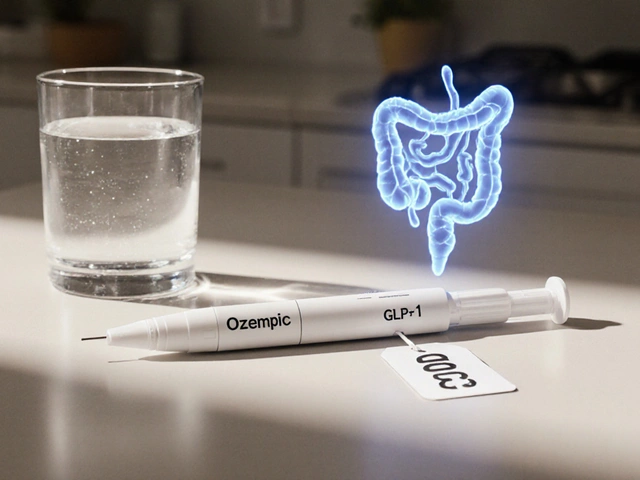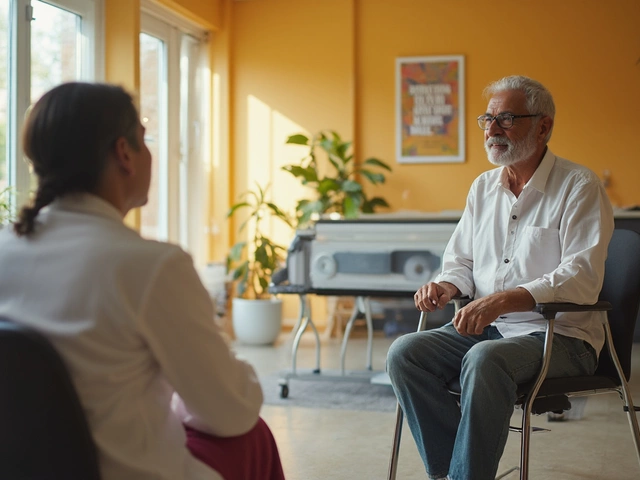Think ADHD is just about getting distracted or bouncing off the walls? Not even close. For adults, the dark side is no joke. We're talking missed bills, work deadlines that slip through the cracks, and a guilt that never seems to let go. It’s the stuff nobody glamorizes.
For a lot of people, ADHD in adulthood means losing keys three times a week, but it’s not funny when you’re running late to every meeting or letting down your friends again. That feeling you get, wondering if you’re just lazy or broken, can really take over. These hidden struggles leave folks questioning their abilities, every single day.
So what does this really mean for your mental health, your relationships, your sense of self? Let's break down the tough stuff and figure out what makes life with adult ADHD so complicated—and how you can actually take back some control.
- Everyday Life: The Silent Struggles
- Relationships and Social Trouble
- Workplace Chaos & Career Risks
- The Emotional Rollercoaster
- Smart Therapy Moves and Self-Help Tips
Everyday Life: The Silent Struggles
When most people hear about ADHD in adults, they think of someone who’s fidgety or forgetful. The reality is, those are just the tip of the iceberg. Daily life gets hit the hardest—stuff as basic as paying bills, keeping appointments, and even sticking with routines feels impossible at times.
Ever had a morning where you left for work but forgot your phone, your wallet, and maybe turned around twice before actually pulling out of the driveway? For someone with ADHD, that’s not just “a bad day”—that’s the play-by-play a lot of the time. This turns even regular chores, like laundry or grocery shopping, into epic battles against distraction and procrastination. Tasks pile up until they turn into stress mountains that feel impossible to climb.
Here’s something wild: A 2023 survey showed that over 60% of adults with ADHD in adults say they often lose important items like keys, bills, or paperwork every week. That’s a ton of wasted time and frustration, but it’s also a recipe for late fees, missed deadlines, and a constant feeling of being in trouble.
| Everyday Task | Common Struggle |
|---|---|
| Pays bills on time | Often late, misses deadlines |
| Maintains home organization | House is cluttered, stuff gets lost |
| Has consistent sleep schedule | Up way too late, struggles to wake up |
The worst part? People start believing they’re just “bad at adulting.” This constant cycle of small failures chips away at mental health. Self-doubt gets louder and louder. If you’re nodding along, you’re not lazy or careless—your brain really works differently. Sometimes, even simple hacks help, like setting alarms for everything or putting reminders in three places, but the struggle is always there in the background.
Relationships and Social Trouble
Here's the rough truth: adult ADHD messes with relationships in all sorts of unexpected ways. Forgetting birthdays, interrupting somebody mid-sentence, and zoning out during talks don’t win you bonus points with friends, partners, or coworkers. Trust me, it’s not just being "quirky"—it can leave people feeling hurt and left out.
Research from 2023 says about 60% of adults with ADHD have ongoing issues with close relationships. The reason? Things like impulsivity (blurting stuff out and oversharing), trouble listening, or emotional outbursts can build tension fast. Over time, partners and friends might start thinking you just don’t care, when really, it's your brain making communication tough.
- Forgetfulness: Missing important dates or plans can create frustration.
- Interrupting: Jumping in when others are speaking makes conversations awkward.
- Emotional swings: Getting super mad or sad at small things can shock people not used to intense mood changes.
- Poor time management: Always running late strains trust and patience.
Sometimes, folks with adult ADHD avoid social stuff just to dodge the stress or embarrassment. Not surprisingly, that loneliness can make everything even heavier. And if you’re like me, you might find your partner (hi, Anjali!) or best friend always picking up the pieces after a social slip-up.
If you want to start making things better, own up to your slips and talk openly with the people you care about. Even something as simple as setting phone reminders for birthdays or meetings can help. Finding a couples therapist or joining an adult ADHD support group can also make a huge difference—these are places where people really get what you live through every day.
| Common Social Struggles | How Often They Happen (percent of adults with ADHD) |
|---|---|
| Missing important events | 70% |
| Interrupting in conversations | 65% |
| Relationship breakups/divorce | 50% |
You’re not alone, not by far. Recognizing how adult ADHD affects your connections is the first step to making things work better—for you, and everyone you care about.

Workplace Chaos & Career Risks
If you’re an adult with ADHD in adults, work is rarely smooth sailing. Jobs that seem simple can turn into daily minefields. Tasks pile up. Emails get missed. Coworkers might think you don’t care, but really, your brain just doesn’t do well with long meetings or mountains of paperwork. It’s not a lack of effort—it’s how ADHD messes with memory, focus, and even time management.
Studies from the National Institute of Mental Health show that adults with ADHD are almost twice as likely to be fired from a job compared to those without it. Promotions can slip away, not because you lack talent, but because you missed a deadline or forgot to follow up. Job hopping becomes common, not out of boredom, but to escape environments where you can’t keep up.
The classic 9-to-5 grind pushes a lot of people with ADHD to the edge. You might feel anxious all day, just trying to remember what you need to finish. There’s even a term for how this plays out: “ADHD tax.” That’s all the little ways mistakes cost you—paying late fees for bills, missing out on raises, having to replace lost items, even losing a job entirely.
| Risk Factor | With ADHD (%) | Without ADHD (%) |
|---|---|---|
| Fired from a Job | 41 | 22 |
| Frequently Late | 61 | 28 |
| Missed Promotions | 34 | 14 |
If all this hits home, you’re not alone. Here’s what can help:
- Break projects into small, clear steps and use checklists.
- Ask your boss for direct feedback—constructive and honest.
- Set reminders for everything, from meetings to lunch breaks.
- Consider jobs that are more hands-on, flexible, or creative.
- If possible, talk openly with HR or a trusted colleague about your ADHD; sometimes, just a little understanding can change the game.
No magic fix here, but knowing you’re not “bad at working”—that it’s a brain thing—can make a difference. Real support and a little adapting at work can help you actually show what you’re capable of.
The Emotional Rollercoaster
If you’re living with ADHD in adults, you probably know the feeling—one moment you’re fired up and buzzing with big ideas, and then boom, your mood tanks for no clear reason. That up-and-down feeling isn’t just a personality quirk. It’s a core part of how adult ADHD shows up.
One of the biggest struggles is emotional regulation. That’s just a fancy way of saying you might have a hard time keeping feelings in check. When anger, frustration, or even excitement hits, it can get really intense—fast. Honestly, sometimes it’s like being on a roller coaster you never bought a ticket for.
Research says folks with adult ADHD are far more likely to experience frequent mood swings than people without it. It’s not uncommon to wake up feeling on top of things and by lunch feel overwhelmed, irritable, or even hopeless. ADHD’s impact on controlling emotions isn’t just in your head; it’s well documented by experts.
It can show up in lots of ways, like:
- Snapping at coworkers or family over tiny stuff
- Feeling rejected even from small negative feedback
- Ruminating on regrets or embarrassing moments for ages
- Quickly going from super interested to bored out of your mind
Managing these swings gets tricky. About half of adults with ADHD deal with anxiety or depression, according to the CDC. That can make the highs more fleeting and the lows even longer. These emotional shifts also explain why some adults are drawn to risky behaviors or even substance use—to try and even things out, just for a bit.
If you notice your moods jumping around a lot or you struggle to let go of negative feelings, you’re not just being sensitive. It’s a classic part of adult ADHD and knowing that gives you a leg up. Writing down triggers, giving yourself short breaks, and talking with someone who gets it can make a real difference. The right therapy can help, too, especially with learning to spot and slow down emotional reactions before they go off the rails.

Smart Therapy Moves and Self-Help Tips
If you’ve got ADHD in adults, those dark days can make you feel stuck. Here’s the real talk: therapy isn’t one-size-fits-all, and quick hacks from TikTok won’t cut it. So what actually works? Evidence says a combo of meds, therapy, lifestyle tweaks, and a whole lot of patience does the trick. Let’s get into some concrete steps.
- Cognitive Behavioral Therapy (CBT): This isn’t just for anxiety or depression—CBT is proven to help adults with ADHD tackle negative thinking, manage time, and organize day-to-day chaos. Therapists who “get” ADHD can teach practical skills, not just talk feelings.
- Medication: For many adults, meds like stimulants or non-stimulants (think methylphenidate or atomoxetine) lower symptoms and boost focus. Don’t DIY with your friend’s prescription—always work with a doctor who knows their stuff about mental health therapy.
- Coaching: ADHD coaches aren’t a fad—they work short-term and help you set routines, stay accountable, and build useful habits. Think of it as a practical buddy system, not traditional therapy.
Besides working with pros, some self-help moves can really improve your game:
- Use external reminders. Sticky notes aren’t childish, they’re life savers. Alarms, calendars, color codes—set them up, everywhere if you need to.
- Break tasks into tiny steps. That “just start” advice works way better when a big job is split into bite-sized chunks—less overwhelming, more doable.
- Limit distractions. Silence notifications, use noise-cancelling headphones, or try a dedicated work/study spot—make focus easier for your brain.
- Move every day. Studies show regular exercise boosts focus and lowers impulsivity in adults with ADHD. Even a twenty-minute walk with my dog Max clears my head big time.
- Keep an ADHD buddy. Whether it’s your spouse, a friend, or an online group—having someone who “gets it” helps keep you honest and less isolated.
| Tool | Main Benefit |
|---|---|
| Digital Reminders | Prevent missed appointments |
| Daily Planners | Break up big jobs into small tasks |
| Timer Apps | Keep focus with set bursts |
| Support Groups | Share experiences, reduce isolation |
The main takeaway? Small, consistent tweaks work. Mixing professional therapy with daily habits makes ADHD in adults more manageable. The tough days won’t vanish, but knowing you’re not alone—and that tools exist—can help you move forward even when the dark side hits hard.

 Best Over-the-Counter Alternatives to Ozempic for Weight Loss
Best Over-the-Counter Alternatives to Ozempic for Weight Loss
 Can You Drive 2 Weeks After Knee Surgery? Here's What You Need to Know
Can You Drive 2 Weeks After Knee Surgery? Here's What You Need to Know
 Surgery with the Longest Recovery Time: What You Need to Know
Surgery with the Longest Recovery Time: What You Need to Know
 When Is ADHD the Hardest? Understanding Age, Struggles, and Strategies
When Is ADHD the Hardest? Understanding Age, Struggles, and Strategies
 Fast 20‑Pound Weight Loss After 50: Proven Steps and Expert Tips
Fast 20‑Pound Weight Loss After 50: Proven Steps and Expert Tips